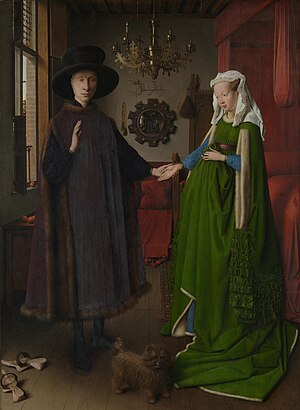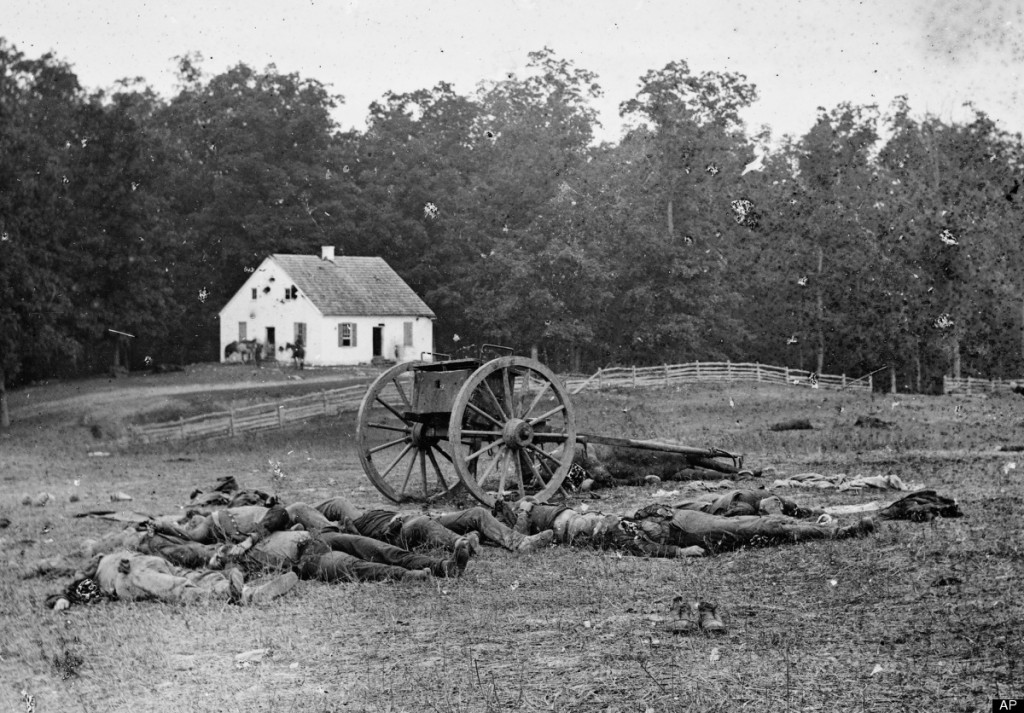All AP Art History Resources
Example Questions
Example Question #1 : Answering Other Questions About Nineteenth Century 2 D Art

Figure 1

Figure 2
The movement represented by these two paintings were a reaction to __________
Romanticist painting.
Medieval painting.
Abstract painting.
Renaissance painting.
Romanticist painting.
Realism, developed and argued for by Gustave Courbet, reacted harshly against Romanticism by attempting to find authenticity and commonality in stark depictions of everyday scenes. In each of these paintings, Courbet portrays himself largely as what he was, a working painter struggling to make a living. In The Desperate Man, Courbet's self-portrait still exhibits some Romantic-era traits, such as energetic strokes and movement. The Meeting, however, is a fully mature Realism, with extremely clean lines depicting a scene of common people rather than monarchs or heroes.
Example Question #2 : Answering Other Questions About Nineteenth Century 2 D Art

Figure 3

Figure 4
Figure 3 is a painting of __________
Hotel des Invalides.
the Pantheon.
the Palace of Versailles.
Rouen Cathedral.
Rouen Cathedral.
This painting is one of a series of paintings by Claude Monet that is a study of the front of Rouen Cathedral in different light, with this one taking place in direct sunlight. All of the Impressionists were highly interested in the different effects of light, but Monet went farther than his fellow Impressionists. The avant-garde artistic approach, including incomplete and highly visible paint lines, is contrasted with the subject of the painting, a Gothic cathedral in Rouen, Normandy.
Example Question #311 : 2 D Art

Figure 3

Figure 4
To capture the light on the edifice, the painter of Figure 3 __________
used watercolors on top of oil paint.
painted in vivid colors.
layered various colors of oil paint.
drew in bright clear lines.
layered various colors of oil paint.
Monet's goal in painting Rouen Cathedral was to capture the ever-changing aspect of light off the stone of the building. Due to constantly-shifting nature of the light, however, Monet had to use a unique approach, wherein he layered small amounts of different but related colors to create a naturalistic effect of shimmering light. This technique and effect would be used later by Monet in his famous series of Water Lillies from his own garden.
Example Question #4 : Answering Other Questions About Nineteenth Century 2 D Art
In the "hierarchy of genres," which of the following genres was accorded the highest place by artistic authorities in the early eighteenth century?
History painting
Still life painting
Portrait painting
Landscape painting
History painting
The "hierarchy of genres" was the dominant view of the different forms of painting by the academies that controlled art in the seventeenth, eighteenth, and nineteenth centuries, especially in France. Different types of painting were seen as requiring more mastery than others. History painting (which included religious and mythological themes) was above all other genres, as it was believed to require more control over its scope and perspective.
Example Question #5 : Answering Other Questions About Nineteenth Century 2 D Art

Pictured above is the Arnolfini Portrait, and can be found at the Website of National Gallery, London.
The painting was most likely commissioned by __________.
Mr. Arnolfini
the local Bishop
the King of the Netherlands
Jan van Eyck
Mr. Arnolfini
The painting, of the Northern European Renaissance, is of Giovanni Arnolfini and his young wife, and the detail of the characters and their home suggests it was commissioned by the couple, likely the husband, for their wedding.
Example Question #11 : Answering Other Questions About Nineteenth Century 2 D Art

The above photo is taken from what conflict?
The Spanish American War
The American Civil War
The Mexican American War
The Napoleonic Wars
The Franco-Prussian War
The American Civil War
During the American Civil War, the medium of photography was still relatively new, having only been invented a few decades before the outbreak of war in 1861. The photographer Matthew Brady was the pioneering figure in developing photography throughout the war. By capturing war in the realistic medium of photography, Brady both helped people see war in a different manner and appreciate the possibilities of photography.
Example Question #311 : 2 D Art
The artistic movement known as Impressionism was reacting against what establishment that set standards in French culture?
Le Exposition Universelle de 1889
Le Sorbonne
Le Salon de Paris
L'ecole des Beaux Arts
Le Salon d'Automne
Le Salon de Paris
The Salon was the absolute pinnacle of the French art world from 1725 to 1890. In the late nineteenth century, the committee in charge of what art work was shown at the Salon valued grand historical and dramatic landscape paintings done in a clean realist style. The Impressionists desired to make paintings of vivid emotion with visible brushstrokes about scenes of everyday life.
Example Question #311 : Ap Art History

Pictured above is a work entitled Impression, Sunrise.
This style of art is most known for which of the following?
painting indoors and the use of free-form brush strokes
painting outdoors and painting hyper-realistic works
painting outdoors and the use of free-form brush strokes
painting indoors and painting hyper-realistic work
painting outdoors and the use of free-form brush strokes
Impressionists where innovative in their brush work, freeing their hand to capture the essence of a work instead of a realistic depiction of the scene portrayed. They also broke with tradition and began to paint outdoors instead of in a studio.
Example Question #312 : 2 D Art

Pictured above is a work entitled Impression, Sunrise.
Roughly when was this work painted?
The early nineteenth century
The late eighteenth century
The early twentieth century
The late nineteenth century
The late nineteenth century
The work was completed in 1872 and marks the beginning of the Impressionist movement in France.
Example Question #13 : Answering Other Questions About Nineteenth Century 2 D Art

Pictured above is a work entitled Impression, Sunrise.
The effect of this work on an audience is best described as __________.
creating a surrealistic effect on psychology
creating an impression
showing what a sunrise looks like
didactically avant-garde
creating an impression
Monet was intending only to capture the feeling of the sunrise and expresses it in only a semi-realistic way. It is not surreal because it lacks the nonrealistic and fantastical quality. It is of this earth, but is not meant to be incredibly realistic.
Certified Tutor
All AP Art History Resources




